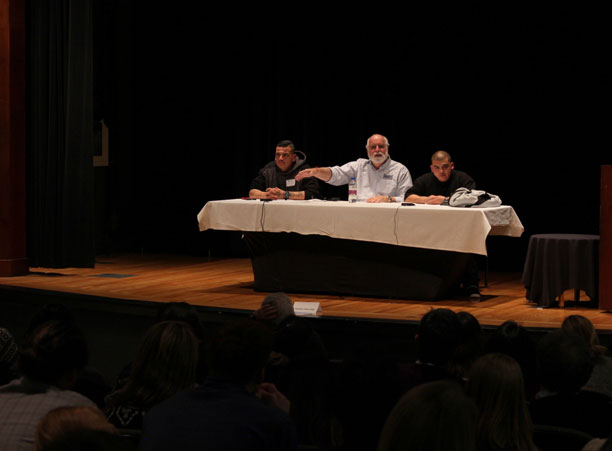 Twenty-year-old David Vasquez stood on stage at Seelos Theatre and walked the captivated audience through the many struggles of his young life: joining a gang at age 12, getting arrested multiple times and impregnating his girlfriend. Ultimately, he recounted, life had dealt so many blows that he knew change was the only viable path forward.
Twenty-year-old David Vasquez stood on stage at Seelos Theatre and walked the captivated audience through the many struggles of his young life: joining a gang at age 12, getting arrested multiple times and impregnating his girlfriend. Ultimately, he recounted, life had dealt so many blows that he knew change was the only viable path forward.
“I realized I had two choices: To go back on the streets or to be in my daughter’s life,” he said.
That’s when a well-meaning relative recommended Vasquez meet Rev. Gregory Boyle, S.J., founder and executive director of the Los Angeles-based Homeboy Industries, the largest gang intervention, rehabilitation and reentry program in the world. Boyle, recipient of an honorary degree from Holy Cross in 1998, returned to Holy Cross Monday night to share his story and the impact of his social-justice-driven mission with students.
That story started in 1988, Boyle shared in an earlier interview, when he founded Jobs For a Future, a program in Los Angeles for recovering gang members and at-risk youth. The City of Angels is known as the “dropout epicenter” of America, he said, and its adolescents struggle with a high rate of recidivism; statistics show that more than half of offenders are rearrested and up to one-third of that population is re-incarcerated within just a few years, according to Homeboys Industries’ website.
Over time, the organization grew into an international, 18-month rotational program that offers participants — or “homies,” as Boyle affectionately calls them — job training, tattoo removal, substance abuse treatment, therapy, education and legal assistance. The idea, Boyle said, is to create a support system and foundation of learning for participants, ultimately motivating them to improve their conduct and avoid future incarceration. Today, Homeboy Industries works with nearly 10,000 people a year, and serves as a model for more than 70 partner organizations in cities all over the world.
Ordained a priest in 1984, Boyle has dedicated much of his life to social justice causes. He was chaplain in the Islas Marias Penal Colony in Mexico and at Folsom prison and worked with Christian Base Communities in Cochabamba, Bolivia. He was awarded the Civic Medal of Honor, the California Peace Prize, and in 2011 was inducted into the California Hall of Fame.
Homeboy Industries’ successful model, Boyle said, is based on a network of kinship that provides community-based alternatives to gang violence, addiction and incarceration. He places emphasis on meditating and trying to find God in all things.
“My job is not to save these guys or to reach them,” he said. “It’s selfish, but my goal is to be reached by them. When you allow yourself to receive, you can savor the world and it will be saved.”
Boyle’s model has served 23-year-old Ruben Ruiz well. Ruiz, another homie who joined Boyle and Vasquez onstage, grew up in an environment he described as full of “gangster love” where he felt pressured to “be tough on the streets.” One trip to Homeboy Industries convinced him it was time to change. By shedding his gang name and removing his tattoos, he said, he now feels like he doesn’t have to hide his real self. He’s now working towards his dream of obtaining a college education. He credits “Father Greg” who taught him how to speak and how to listen — how to love himself and others, and most importantly, how to count his blessings and take hold of his aspirations.
Many students, including Raha Maalin ’17, walked away from the presentation with a deep appreciation for Boyle’s work.
“Fr. Boyle’s genuine empathy for others, and his ability to live in solidarity is both sincere and moving,” she said. “He truly understands the complex identities of the people he interacts with and is able to approach them with empathy.”
The event was presented by the Rev. Michael C. McFarland, S.J. Center for Religion, Ethics and Culture.
Watch the talk below:
Tough Love: Founder of Homeboy Industries Preaches Jobs, Not Jails, for Gang Members
Read Time
3 Minutes